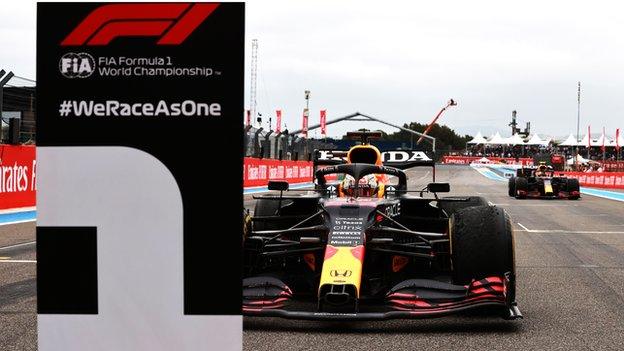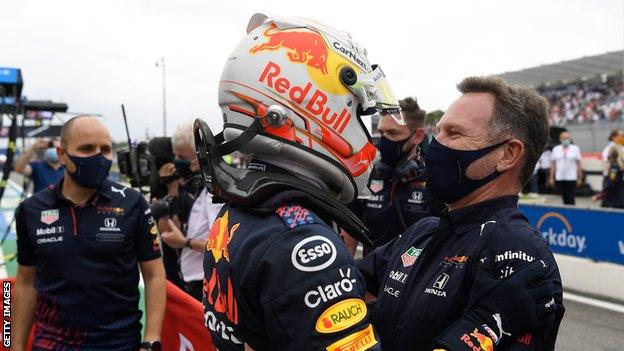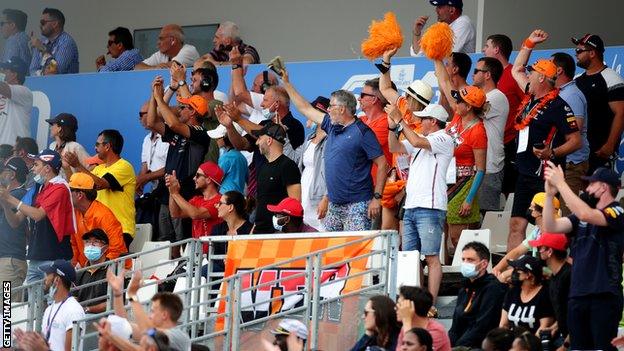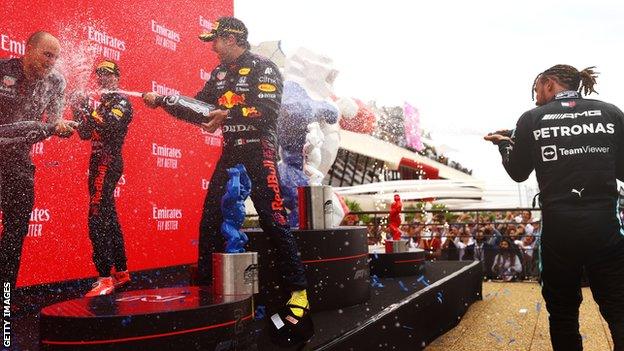French Grand Prix: Did Mercedes lose it or Red Bull win it?
- Published

Despite an early mistake Max Verstappen regained the lead late to win the race
This Formula 1 season just keeps on delivering, after Max Verstappen took a brilliant victory in a French Grand Prix that left Lewis Hamilton and Mercedes ruing a costly error.
Did Mercedes lose the race or Verstappen tear it from their grasp? In truth, it was a bit of both, as a see-saw sequence of events flipped the advantage back and forth between the two title rivals at Paul Ricard.
Verstappen started the race in front, but handed the lead to Hamilton with a mistake at the first corner. Mercedes gave it back to him with a pit-stop strategy error, on which Verstappen capitalised with two brilliant laps around the pit stop.
Once in the lead, Red Bull chose to surrender it with what team principal Christian Horner described as a "ballsy call" and ask Verstappen to recover 18 seconds in 20 laps. He passed Hamilton with a lap and a half to go to take a win that underlines yet again the seriousness of the threat Mercedes face from a resurgent Red Bull this year, and moves the Dutchman into a 12-point championship lead.
"This is a tough one this year," Mercedes team boss Toto Wolff said afterwards.
Verstappen pounces on Mercedes error
There were a number of things Red Bull had to do to win in France after Verstappen had slid wide at the first corner and dropped behind Hamilton. But there was little doubt about the moment at which Mercedes lost it.
With Hamilton leading in the first stint, the race was in Mercedes' hands, and as the first pit stops approached, they felt they were very much in control.
They pitted Hamilton's team-mate Valtteri Bottas from third place on lap 17. This forced Red Bull to respond with Verstappen the next time around. The obvious thing was for Mercedes to stop Hamilton on lap 18, too. Had they done so, he would have maintained the race lead and probably never lost it.
But, with a 3.1-second lead over Verstappen, they felt safe to leave Hamilton out for one extra lap.
In theory, that was too big an advantage for the Dutchman to overturn with the so-called undercut - stopping a lap early and benefiting from a lap's worth of fresh-tyre grip.
But the theory was wrong - and Verstappen made it so.
Immediately after the race, Mercedes were still not sure how Verstappen had managed to take the lead, sweeping past Hamilton into Turn One as the world champion emerged from the pits. After all, Bottas had gained only 1.2secs on Verstappen with his one-lap-earlier stop. Somehow, Verstappen made nearly three times that on Hamilton.
Verstappen's in-lap accounted for some of that - just under 0.6secs faster than Hamilton's. The time Verstappen spent in the pit lane was about 0.6secs less than the Mercedes driver. And on what Red Bull team principal Christian Horner described as a "stonking" out lap, Verstappen gained 1.6secs relative to Hamilton.
"My out lap was good," Verstappen said, "but I didn't expect the undercut to be so big. But when I went out I had suddenly so much more grip on the tyres everywhere. We never expected to undercut Lewis. With the tricky conditions on used tyres, it is easy to lose the car a little bit. Whereas on new tyres you have one lap when the tyres feel so much better."
Hamilton was perplexed."I don't know [how it happened]," he said. "Great pit stop. Have to go back and look at it. I was definitely down on my in-lap, my tyres were getting worse."

Christian Horner (right) called the result "payback for Barcelona" over the team radio
A bold and tricky call
Now Verstappen and Red Bull were in control of the race, but Hamilton was determined to wrest it back, and he started pushing Verstappen very hard, the idea being to force him to use up his tyres.
For nine laps, Hamilton was within a second of Verstappen.
"Max was being pushed very hard and wasn't able to manage the tyres," Horner said. "Mercedes were telling their drivers to put the pressure on us and we thought they were gearing up for a two-stop themselves."
Verstappen came on the radio and said he could not keep up this level of pace and make it to the end of the race. "The strategists presented the options," Horner said, "and said: 'We've got nothing to lose.'"
Pitting out of the lead is never an easy call but on lap 32, only 14 laps after he had stopped for the first time, Verstappen was brought in again.
This was not as easy a decision as it had been for Mercedes in Spain a month and a half ago, where they called in Hamilton out of second place and he fought back to win. Then, the predictions were saying it was a slam-dunk that Hamilton would catch and pass Verstappen before the end of the race. On Sunday, there were question marks. But Verstappen soon dispelled them.
The rate at which he was catching Hamilton progressively reduced - from two seconds a lap initially, to one second as the race entered its last 10 laps - but with two to go Verstappen was on the Mercedes' tail, and Hamilton had run out of front tyres. Half way around the penultimate lap, the Red Bull was through and away.

Verstappen fans were present to celebrate the Dutch driver's victory
What if Mercedes had not made their mistake?
Hamilton felt that Mercedes were always on the back foot in France.
"It just didn't work out," he said. "I am not massively disappointed; I did the best job I could today. There are things we could do slightly better, but overall they have been quicker than us all weekend and it's true reflection of the pace they have.
"If he had not made the mistake in Turn One, they would have led the race all the way probably."
And Horner felt Verstappen still would have won if Mercedes had pitted Hamilton for his first stop when they should have.
"It would almost have been easier if they had kept track position," he said. "Because then we would have pulled the trigger anyway. It would have made our decision easier, but to make the decision [to pit] from the lead was quite a ballsy call. It was the fastest way we thought, to the end of the race."
In fact, though, the likelihood is that once Verstappen had lost the lead at the first corner, he would probably not have won had Mercedes not made their critical strategy error. Hamilton would have retained track position and would probably have been able to fend Verstappen off to the flag.
This is why:
In the race as it happened, Hamilton really thrashed his tyres for those nine laps after his pit stop, so they were more or less gone by the time Verstappen caught him. Had he kept the lead, he would have been able to manage his tyres more carefully, and had a lot more life in them when Verstappen was trying to catch him.
On top of that, Verstappen would have been pitting from behind, not in front. As it was, the Red Bull had a 2.2-second advantage when he stopped for a second time. Had Verstappen been in second place, he would have been at least a second behind, and probably at least two. That's a net swing of more than four seconds - and his winning margin was only 2.9secs.
So had Mercedes not made their crucial error in delaying Hamilton's first stop, Verstappen would likely not have had enough to catch and pass the Mercedes before the end of the race.
"The car performance was good," Mercedes F1 boss Toto Wolff said. "We had the quicker car probably. We lost the race at the [first] stop."
Even Horner admitted that the Mercedes was at least an equal for the Red Bull on race pace.
"Strategically we were better," Horner said. "There is very, very little between the cars. Arguably in the wind we had today, their race pace looked a bit more comfortable for them."

Red Bull's strategy was key to their win at the French Grand Prix
'It just shows how close it is'
It was, then, another tight race between two wonderful drivers and two great teams decided by fine margins. In this case, a strategic error from Mercedes, and some superlative driving from Verstappen around the first pit stops.
Once Verstappen had the lead, Hamilton had problems - he wasn't going to pass Verstappen on track, but in trying to do so he took enough out of his tyres to make it difficult to defend at the end.
Had Hamilton not done that, though, Verstappen could have looked after his tyres and just stayed out. Mercedes could have tried to switch to a two-stop. But from behind rather than in front that was always going to be tough to pull off on this particular day, especially as he would have had to pass the second Red Bull of Sergio Perez, who would have been significantly less accommodating than he was to team-mate Verstappen.
Verstappen said: "It just shows the two teams are super-close together. One weekend you get it right on strategy and then the next weekend the other team gets it right. It is really exciting. It is still a very long season. We just have to keep pushing. It is good for F1 in the end."
